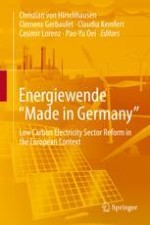
2018 | OriginalPaper | Buchkapitel
1. Introduction
verfasst von : Christian von Hirschhausen, Clemens Gerbaulet, Claudia Kemfert, Casimir Lorenz, Pao-Yu Oei
Erschienen in: Energiewende "Made in Germany"
Aktivieren Sie unsere intelligente Suche, um passende Fachinhalte oder Patente zu finden.
Wählen Sie Textabschnitte aus um mit Künstlicher Intelligenz passenden Patente zu finden. powered by
Markieren Sie Textabschnitte, um KI-gestützt weitere passende Inhalte zu finden. powered by